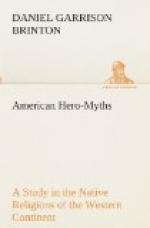“Have no fear,” he said, “I left you in order that the great empire of the Incas might be known to men. Leave, therefore, this settlement of Tampu quiru, and descend into the Valley of Cuzco, where you shall found a famous city, and in it build a sumptuous temple to the Sun. As for me, I shall remain in the form in which you see me, and shall dwell in the mountain peak Guanacaure, ready to help you, and on that mountain you must build me an altar and make to me sacrifices. And the sign that you shall wear, whereby you shall be feared and respected of your subjects, is that you shall have your ears pierced, as are mine,” saying which he showed them his ears pierced and carrying large, round plates of gold.
They promised him obedience in all things, and forthwith built an altar on the mountain Guanacaure, which ever after was esteemed a most holy place. Here again Ayar Cachi appeared to them, and bestowed on Ayar Manco the scarlet fillet which became the perpetual insignia of the reigning Inca. The remaining brothers were turned into stone, and Manco, assuming the title of Kapac, King, and the metaphorical surname of Pirhua, the Granary or Treasure house, founded the City of Cuzco, married his four sisters, and became the first of the dynasty of the Incas. He lived to a great age, and during the whole of his life never omitted to pay divine honors to his brothers, and especially to Ayar Cachi.
In another myth of the incarnation the infinite Creator Ticci Viracocha duplicates himself in the twin incarnation of Ymamana Viracocha and Tocapu Viracocha, names which we have already seen mean “he who has all things,” and “he who perfects all things.” The legend was that these brothers started in the distant East and journeyed toward the West. The one went by way of the mountains, the other by the paths of the lowlands, and each on his journey, like Itzamna in Yucatecan story, gave names to the places he passed, and also to all trees and herbs of the field, and to all fruits, and taught the people which were good for food, which of virtue as medicines, and which were poisonous and to be shunned. Thus they journeyed westward, imparting knowledge and doing good works, until they reached the western ocean, the great Pacific, whose waves seem to stretch westward into infinity. There, “having accomplished all they had to do in this world, they ascended into Heaven,” once more to form part of the Infinite Being; for the venerable authority whom I am following is careful to add, most explicitly, that “these Indians believed for a certainty that neither the Creator nor his sons were born of woman, but that they all were unchangeable and eternal."[1]
[Footnote 1: Christoval de Molina, Fables and Rites of the Incas, p. 6.]
Still more human does Viracocha become in the myth where he appears under the surnames Tunapa and Taripaca. The latter I have already explained to mean He who Judges, and the former is a synonym of Tocapu, as it is from the verb ttaniy or ttanini, and means He who Finishes completes or perfects, although, like several other of his names, the significance of this one has up to the present remained unexplained and lost. The myth has been preserved to us by a native Indian writer, Joan de Santa Cruz Pachacuti, who wrote it out somewhere about the year 1600.[1]




